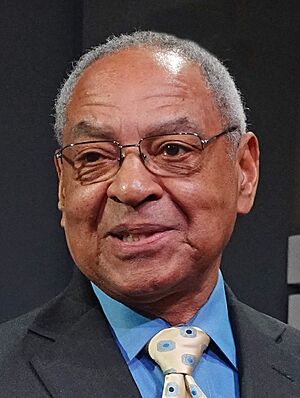George Moose facts for kids
Quick facts for kids
George Moose
|
|
|---|---|
 |
|
| United States Representative to the United Nations in Geneva | |
| In office November 18, 1997 – May 31, 2001 |
|
| President | Bill Clinton George W. Bush |
| Preceded by | Daniel Spiegel |
| Succeeded by | James Foley |
| 11th Assistant Secretary of State for African Affairs | |
| In office April 2, 1993 – August 22, 1997 |
|
| President | Bill Clinton |
| Preceded by | Hank Cohen |
| Succeeded by | Susan Rice |
| United States Ambassador to Senegal | |
| In office October 13, 1988 – May 21, 1991 |
|
| President | Ronald Reagan George H. W. Bush |
| Preceded by | Lannon Walker |
| Succeeded by | Katherine Shirley |
| United States Ambassador to Benin | |
| In office November 4, 1983 – July 7, 1986 |
|
| President | Ronald Reagan |
| Preceded by | James B. Engle |
| Succeeded by | Walter Stadtler |
| Personal details | |
| Born |
George Edward Moose
June 23, 1944 New York City, New York, U.S. |
| Education | Grinnell College (BA) Syracuse University |
George Edward Moose (born June 23, 1944) is an American diplomat. A diplomat is someone who represents their country in dealings with other nations. He served as the leader of the board for the United States Institute of Peace from 2021 to 2025. Before that, he held many important roles. He was the Assistant Secretary of State for African Affairs from 1993 to 1997. He also served as the U.S. Representative to the United Nations in Geneva from 1997 to 2001. In the 1980s and 1990s, he was an Ambassador to the countries of Benin and Senegal. He is especially known for his work during the Rwandan genocide when he was Assistant Secretary of State for African Affairs under President Bill Clinton.
In March 2025, George Moose was removed from his position at the US Institute of Peace. This happened as part of efforts by the Trump administration to change how some government-supported programs work. A White House spokesperson said it was because the Institute did not follow a recent order from President Trump. However, in May 2025, this action was declared illegal and invalid.
George Moose's Life and Career
George Moose was born in New York City in 1944. He grew up in Denver, Colorado. He earned a degree from Grinnell College. He also studied at the Maxwell School of Syracuse University. In 1967, he joined the United States Foreign Service. This is a group of people who work for the U.S. government in other countries.
His early jobs took him to Washington D.C., Barbados, Vietnam, and the U.N. in New York. He can speak Vietnamese and French.
In October 1993, George Moose led the American group that attended the first Tokyo International Conference on African Development. This was an important meeting about helping African countries grow.
In 2002, he received a special promotion. He became a Career Ambassador. This is the highest rank a diplomat can achieve.
Today, George Moose teaches a course at George Washington University's Elliott School of International Affairs. The course is called "Reinventing the United Nations." He is also a fellow at the Harvard University Institute of Politics. There, he leads a study group about Africa's role in the world. Since 2003, he has been on the Board of Directors for an organization called Search for Common Ground. This group works to solve conflicts peacefully.
External Links
- Legacy Ambassador George E. Moose shared his life story in interviews with Legacy.
- United States Department of State: Career of George Edward Moose
| Diplomatic posts | ||
|---|---|---|
| Preceded by James B. Engle |
U.S. Ambassador to Benin 1983–1986 |
Succeeded by Walter Stadtler |
| Preceded by Lannon Walker |
U.S. Ambassador to Senegal 1988–1991 |
Succeeded by Katherine Shirley |
| Preceded by Daniel Spiegel |
U.S. Representative to United Nations in Geneva 1997–2001 |
Succeeded by James Foley |
| Political offices | ||
| Preceded by Hank Cohen |
Assistant Secretary of State for African Affairs 1993–1997 |
Succeeded by Susan Rice |

